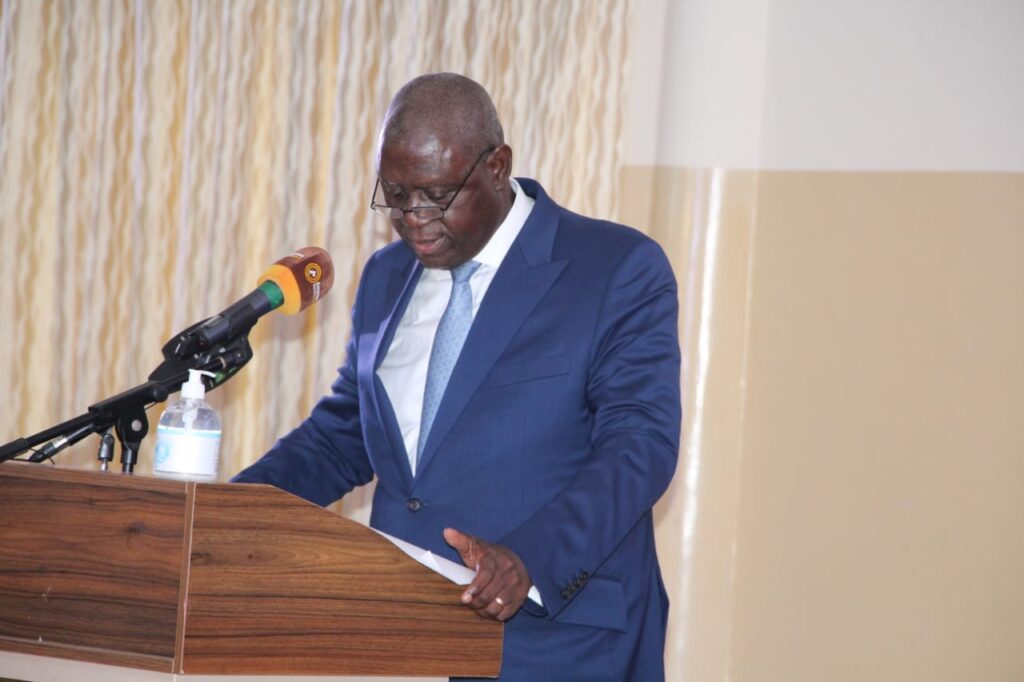The Chief Justice of Ghana, Justice Anin -Yeboah has stated that Ghana must leverage the opportunity covid-19 presents to roll out an electronic -justice delivery system across the country to enhance transparency, effectiveness and accessibility.
He said this when speaking at the 13th Annual Chief Justice’s Forum in Koforidua on Thursday, November 18, 2021, under the theme “Justice for All Under Constitutional Rule; Making justice Delivery Accessible in a Pandemic“.
The Chief Justice acknowledged the e-justice system being piloted at the Law Court Complex in Accra by the Judicial Service of Ghana in partnership with the Ministry of Communication and World Bank, however, stated that the concomitant encumbrances of Covid-19 pandemic to justice delivery in Ghana present an opportunity for Ghana to fully integrate Information, Communication and Technology (ICT) in justice delivery.
“Covid-9 has forged a whole new world -one with an increasing reliance on technology. The legal profession must therefore give us technological advancement and adapt to the times, and the Judiciary must be at the forefront of this. Admittedly, change will, however, not come suddenly but will most likely be in a gradual process,” Justice Anin-Yeboah said.
He continued, “the inevitability of this change, nevertheless, means that it is necessary to adequately and continuously prepare ourselves for an ever-changing world where we must of necessity take the lead in deploying technology to ensure efficiency in Justice Delivery for our people in Ghana. A concerted effort is however required by all stakeholders in other to leverage the opportunity covid -19 presents for delivering technology-based justice delivery system into the future”.
President of Ghana Bar Association (GBA) Yaw Acheampong Boafo, underscored the importance of technology to access justice hence pledged the commitment of the Association to use its experience in digitizing its administrative platforms and services across the country to redirect, facilitate and source funding for the establishment of tailor-made e-justice system suitable to the judicial environment in the country.
“It has been over 10 years and lawyers do not have access to the use of e-justice from their chambers as promised. We still have to print papers, travel to the law court complex in Accra to file processes. Lawyers have to travel to court only to be told the Judge is not sitting. Although the Project has been launched, we are aware that the programmers from Zimbabwe are yet to do an end-to-end demonstration system. We, therefore, need to assemble our own judges, lawyers, judicial administrators and paralegals and not depend on outsiders no matter how skilful they are. We need to design our systems and specify how we want the system to feel like and look like”.
The Chairperson of NCCE, Josephine Nkrumah called for deliberate interventions to increase access to justice delivery to women and the marginalized.
She also appealed for the reintroduction of the training of NCCE staff to participate in dispensing resolution through Alternate Dispute Resolution (ADR).
The President of Eastern Regional House of Chiefs, Nene Sakite II, Kornor of Manya Krobo Traditional area who was chairman of the occasion, called for continued expansion of frontiers of Justice, increase access, and ensure that the law becomes natural resources for citizens in search of resolution and justice.
He said the more citizens have confidence in the law courts the less attempt to take the laws into their own hands.
A presentation on research findings commission on the state of court facilities in Ghana submitted by Dr Kwaku Agyemang Budu revealed general heavy caseload, poor infrastructure, lack of proper maintenance culture, poor security, lack of furniture, equipment and stationery needs, deplorable washrooms and encroachment .
Source: Ghana/Starrfm.com.gh


